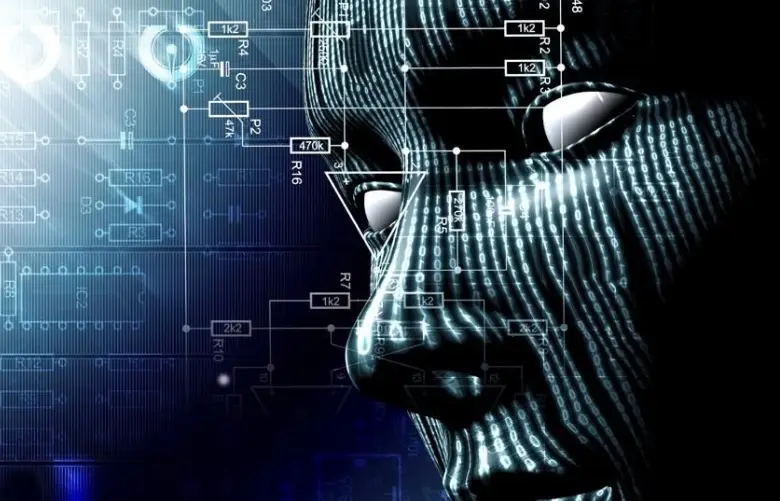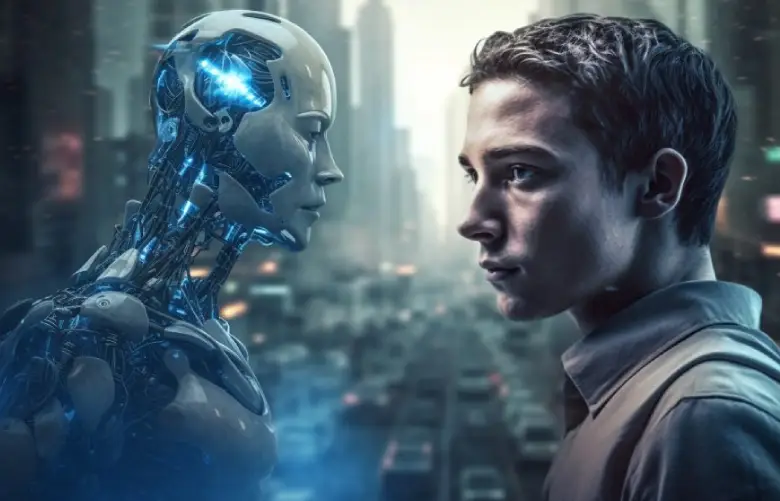AI robots, at the forefront of technological advancement, seamlessly blend robotics and artificial intelligence, opening doors to a new era of innovation. These remarkable creations are more than machines; they can perceive their surroundings, make decisions, and learn from experiences.
AI robots are designed to tackle various tasks, from simplifying everyday chores to revolutionizing industries like healthcare, manufacturing, and space exploration.
In the section below, we’ll discover their inner workings, potential benefits, and the ethical considerations of granting machines such extraordinary capabilities.
So, let’s get started.
Introduction to AI Robots
AI robots represent a remarkable fusion of cutting-edge technology, combining the power of AI and robotics to create machines that mimic human-like cognitive functions.
At their core, these robots are designed to go beyond traditional programming by being able to adapt, learn, and make decisions based on their environment and the data they gather.
They are equipped with sensors to perceive their surroundings, process information, and utilize algorithms to navigate complex tasks. This exciting field delves into machine learning, computer vision, and natural language processing, enabling AI robots to perform diverse tasks with increasing autonomy and sophistication.
Here are the Top-Backend Languages to Know in 2024.


Get curriculum highlights, career paths, industry insights and accelerate your data science journey.
Download brochure
Importance and Impact of AI Robots
The emergence of AI robots carries profound significance across various aspects of our lives. These intelligent machines have the potential to revolutionize industries, reshape daily routines, and even influence how we interact with technology.
By seamlessly blending AI and robotics, they can tackle tasks that were once labor-intensive or unsafe for humans, enhancing productivity and efficiency in manufacturing, healthcare, and agriculture.
Moreover, AI robots can assist people with disabilities, enabling greater inclusivity. However, their rise also prompts discussions about job displacement, privacy concerns, and autonomous systems’ ethical use.
How AI Robots Work
AI robots function as a harmonious blend of robotics and artificial intelligence, allowing them to perform tasks with autonomy and intelligence.
These machines are equipped with sensors, an AI “brain,” and the ability to learn from experience, enabling them to interact with their environment and make informed decisions.
Understanding Robotics and Artificial Intelligence
Artificial intelligence (AI) is the cornerstone of AI robots. It involves the creation of algorithms and systems that mimic human cognitive functions, such as learning, reasoning, problem-solving, and decision-making.
In the context of robotics and artificial intelligence, this technology enables them to process information, adapt to different situations, and improve their performance over time through learning.
Integration of AI in Robotics
Integrating robotics and artificial intelligence empowers machines to move beyond programmed responses and react intelligently to new situations. By combining AI’s ability to process data and make decisions with the mechanical capabilities of robots, we create systems that can navigate complex environments, analyze inputs, and execute tasks with precision.
Sensing and Perception
Sensors serve as the eyes and ears of robotics and artificial intelligence engineering. They gather data from the robot’s surroundings, including visual, auditory, tactile, and even environmental information. These sensors translate real-world information into digital data that the robotics and artificial intelligence brain can understand.
This sensory input is crucial for the robot’s ability to understand its environment, detect obstacles, and interact effectively with its surroundings.
Decision-Making and Learning
Best AI robot uses the data collected from sensors to make informed decisions. Their AI components process this data using complex algorithms, identifying patterns and trends. Through machine learning, robots can adapt their behavior based on their experiences.
As they encounter different situations and outcomes, they refine their decision-making processes, becoming more efficient and effective. Click here to learn about Artificial Intelligence and Machine Learning in depth.
Types of AI Robots
Robotics and artificial intelligence engineering come in various forms, each tailored to specific tasks and industries. These intelligent machines are designed to simplify processes, improve efficiency, and even enhance human experiences. Here are three main types:
Industrial Robots
Industrial robots, often seen on manufacturing floors, are masters of precision and repetition. These robots handle tasks that are often labor-intensive, monotonous, or even hazardous for humans. Equipped with sensors and advanced algorithms, they can assemble products, weld materials, paint surfaces, and perform other intricate tasks with incredible accuracy.
Industrial robots optimize production lines, reducing errors and increasing output, ultimately leading to higher-quality products.
Service Robots
Service robots are the friendly faces of automation, aimed at making our lives more convenient. These robots cater to a wide range of tasks in various settings. You might find them in hotels as receptionists or in restaurants delivering orders to tables.
They can also assist with cleaning, security, and customer service in shopping centers or airports. These robots rely on AI to navigate through crowded spaces, interact with people, and perform their designated tasks, enhancing efficiency and customer satisfaction.
Healthcare Robots
Healthcare robots are pivotal in the medical field, assisting healthcare professionals and patients alike. They can take on tasks such as administering medication, conducting precise surgical procedures, and even providing companionship for the elderly.
With their ability to perform intricate movements and follow precise instructions, healthcare robots contribute to safer and more effective treatments, reducing the risk of human errors and allowing medical personnel to focus on critical decisions.
Applications of AI Robots
Robotics and artificial intelligence have permeated various sectors, transforming how we work, interact, and live. Their capabilities extend across industries, offering innovative solutions to complex challenges. Here are two prominent applications:
Manufacturing and Automation
In the realm of manufacturing, robotics and artificial intelligence have revolutionized production processes. These robots are meticulously programmed to handle intricate tasks like assembling delicate electronics, welding precise joints, and even packaging products efficiently.
With sensors that ensure accuracy and AI-powered algorithms that adapt to changing conditions, they significantly enhance production speed and quality. Reducing manual labor improves workplace safety and allocates human resources to more strategic roles.
Healthcare and Medical Assistance
Robotics and artificial intelligence engineering are making their mark in healthcare, where precision and efficiency are paramount. Surgical robots assist surgeons with complex procedures, enabling minimally invasive surgeries with improved precision and reduced recovery times. Robots can also handle tasks like drug dispensing, reducing human error in medication administration.
Moreover, AI-driven diagnostic tools aid in the early detection of diseases by analyzing vast amounts of medical data. Telepresence robots facilitate remote consultations and monitoring, connecting doctors and patients across distances. In eldercare, social robots provide companionship to alleviate loneliness among the elderly.
Challenges and Future Trends
Challenges:
- Ethical Concerns: As AI robots become more autonomous, questions arise about their ethical use.
- Job Displacement: The rise of AI robots can lead to concerns about job displacement, particularly in industries heavily reliant on manual labor.
- Privacy and Security: Best AI robot often gather and process large amounts of personal and sensitive data. Safeguarding this information from breaches and unauthorized access is crucial to prevent privacy infringements.
- Complex Decision-Making: Developing AI robots capable of nuanced decision-making in dynamic and unpredictable environments remains a challenge.

Future Trends
- Collaborative Robotics (Cobots): The future holds increased collaboration between humans and robots. Cobots are designed to work alongside humans, aiding in tasks that require a combination of human intuition and robot precision.
- Advanced Learning and Adaptation: AI robots will continue to evolve through machine learning and adaptive algorithms. They’ll learn better from experiences, allowing them to tackle a broader range of tasks and adapt to changing environments.
- Emotional Intelligence: Future robots might possess emotional intelligence, enabling them to understand and respond to human emotions. This is particularly relevant in fields like healthcare and education.
- Customization and Personalization: AI robots could be tailored to individual preferences and needs, enhancing user experiences. This customization can apply to service robots, healthcare companions, and more.
- Interconnectivity: AI robots will likely become more interconnected, communicating and collaborating seamlessly within smart environments. This can lead to enhanced coordination and efficiency.
Conclusion
In the world of AI robots, science fiction meets reality. These intelligent machines blend robotics and artificial intelligence, unlocking unprecedented capabilities. From manufacturing efficiency to healthcare advancements, they reshape industries and daily life. Embracing their potential while addressing challenges ensures a future where humans and robots thrive together.
FAQs
AI empowers robots to think and learn like humans. It equips them with decision-making abilities, enabling them to adapt to new situations, process sensor data, and improve their performance over time. This fusion of AI and robotics creates intelligent machines that can perform complex tasks autonomously.
AI robots find use in diverse fields. They enhance manufacturing precision, aid surgeons in complex surgeries, assist with customer service in retail, and even provide companionship in eldercare. They also play a role in hazardous environments like mining and exploring space, where human presence is risky.
Yes, ethical concerns arise. Issues like robot rights, accountability for robot actions, and potential job displacement need careful consideration. Ensuring robots make unbiased decisions and safeguarding data privacy are also vital aspects. Striking a balance between technological advancement and ethical use is crucial.
The future holds promising developments. Robots will become more collaborative, emotionally intelligent, and adaptable. They'll be more personalized to individual needs, enhancing user experiences. However, ethical, social, and economic implications will need ongoing attention to ensure responsible and beneficial integration.
AI robots impact various industries. Manufacturing benefits from increased efficiency, healthcare sees improved surgeries and patient care, and service sectors benefit from automation. Agriculture gains precision in planting and harvesting, while logistics and warehousing benefit from efficient sorting and delivery systems. AI robots also have implications for education and entertainment.
Updated on November 5, 2024










